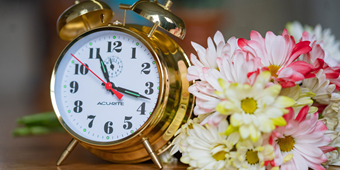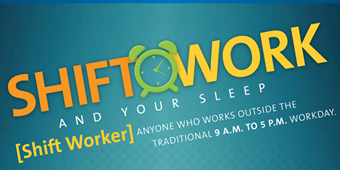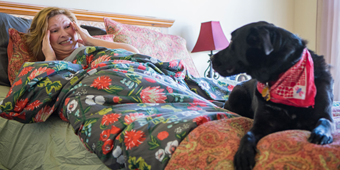Sleepy? You Could Have a Circadian Rhythm Sleep Disorder
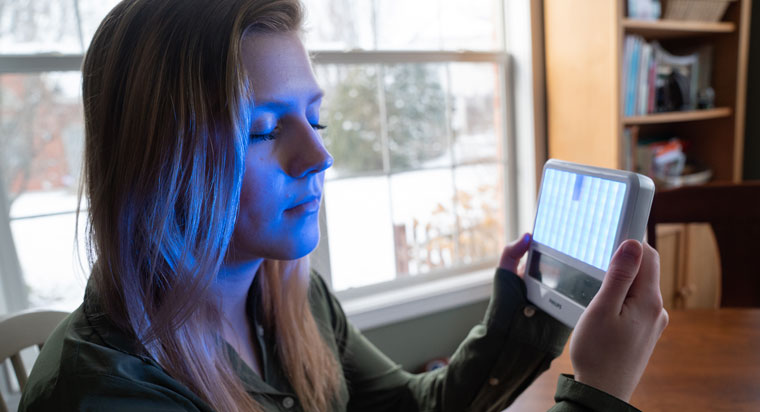
Find Your Perfect Match
Answer a few questions and we'll provide you with a list of primary care providers that best fit your needs.
When your body clock is ticking as it should, it’s in a rhythm that tells you when to go to sleep and when to wake up. If this natural timing is disrupted, you may be unable to fall asleep, sleep poorly, or feel drowsy during the day. You could have one of the following circadian rhythm sleep disorders (CRSD).
Delayed Sleep-Wake Phase
If you’re falling asleep two or more hours later than everyone else, and waking two or more hours after everyone else, you likely have a CRSD called delayed sleep-wake phase. More common in teens and young adults, this disorder can interfere with work, school, and other commitments.
Experts believe this disorder runs in some families. Lack of morning sunlight or too much exposure to bright evening light can make it worse.
A sleep specialist can help you overcome this disorder. Common treatments are:
- Timed dosage of melatonin
- Bright light therapy
- Cognitive behavioral therapy to help you change the thoughts and behavior that hurt your ability to sleep well
Advanced Sleep-Wake Phase
This CRSD is the opposite of delayed sleep-wake phase. With advanced sleep-wake phase, you wake up very early, between 2 and 5 a.m. This causes you to fall asleep much earlier than normal, and even when deprived of sleep, you wake up early.
This disorder is rare, occurring in only about one percent of middle-aged adults. It’s a bit more common in older adults. It may be caused by social or work pressures, environmental factors, or there may be a genetic link.
If you can adapt your lifestyle to this earlier-than-usual sleep schedule, treatment won’t be necessary. If the disorder is causing problems (with work, family, or social activities), a sleep specialist can help. Treatment options include behavioral changes and bright light therapy.
Irregular Sleep-Wake Rhythm
With this CRSD your sleep pattern is fragmented. You get your sleep during numerous naps throughout the day and night instead of all at once. This disorder is rare and sometimes occurs alongside:
- Dementia
- Brain damage
- Mental disability
- Lack of exposure to light each day
Symptoms include chronic insomnia and sleepiness. It may be hard to maintain relationships and responsibilities. Becoming homebound and isolated is common and can make the disorder worse.
It is important to seek advice from a sleep specialist if you have this disorder. Self-medicating with alcohol or over-the-counter drugs is not advisable. You may be asked to wear an actigraph device, which looks like a wrist watch, to record your activity over one or two weeks. Treatment for this disorder may include light therapy, education, and behavioral counseling.
Non-24-Hour Sleep-Wake Rhythm
When you have this CRSD you sleep for a normal length of time, but you fall asleep a little later every day. This means that sometimes you’re sleeping during the day instead of night. It’s a cycle that is common among people who are blind (more than 50 percent of people who are blind suffer from this disorder). That’s because light has the biggest influence on our body clock. The disorder rarely occurs in sighted people.
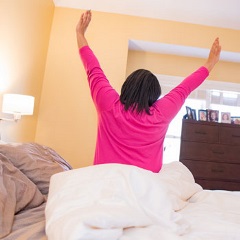 This disorder may occur alongside:
This disorder may occur alongside:
- Mental disability
- Brian injury
- Dementia
- Psychiatric or personality disorders
- Substance abuse
- People being treated for delayed sleep phase disorder
The goal of treatment is to have one long period of sleep at night, and one long period of being awake during the day. Your sleep specialist may recommend dosages of melatonin at prescribed times of the day. Education and behavioral counseling may also be helpful. Light therapy is sometimes advantageous for sighted people.
If you’re falling asleep two or more hours later than everyone else, and waking two or more hours after everyone else, you likely have a CRSD called delayed sleep-wake phase.
Jet Lag
This temporary CRSD occurs when you travel across two or more time zones. The more time zones you cross, the worse the jet lag. It’s especially troublesome if you’re traveling east. It is estimated that it takes one day per time zone for your body clock to fully adjust to local time.
Jet lag can be worsened by:
- Spending a long time sitting in an uncomfortable position
- Stress
- Caffeine and alcohol
- Poor air quality
In addition to feeling tired during the daytime, symptoms may also include mild sickness, stomach problems, and menstrual symptoms in women.
Jet lag usually doesn’t require treatment by a sleep specialist. Prior to your trip you may try:
- Slowly adjusting your sleep time prior to leaving so that it is closer to the sleep time at your destination
- Spending time in the sun or in artificial bright light once you reach your destination. This will help reset your internal clock.
- Asking your doctor about melatonin or a sleeping pill to help you adjust more quickly to the new time zone
- Reducing caffeine and alcohol consumption
- Moderate exercise once you reach your destination
Shift Work Disorder
This happens when you have a job that forces you to stay awake when you want to sleep. And when you have the chance to sleep, your body wants to be awake. If you have this disorder you likely sleep about four hours less per day than average. You may have trouble sleeping, be severely tired, and wake up feeling tired. For some, the end result is poor performance at work and irritability. Symptoms usually last as long as you have the job that requires shift work.
There are several variations to shift work that might also cause you to sleep poorly. They include working early-morning shifts, night shifts, overnight shifts, and rotating shifts. Not everyone who does shift work suffers from this disorder.
A sleep specialist can help you adjust to your work schedule and improve your sleep. Treatment options include:
- Bright light therapy
- Sleep medications
- Melatonin
Find Your Perfect Match
Answer a few questions and we'll provide you with a list of primary care providers that best fit your needs.
Sources: National Sleep Foundation; Circadian Sleep Disorders Network; American Alliance for Healthy Sleep


